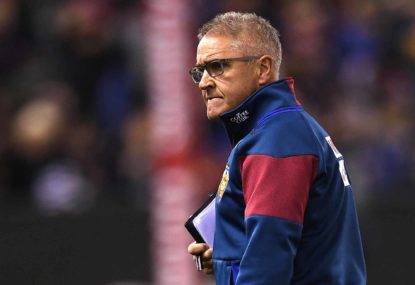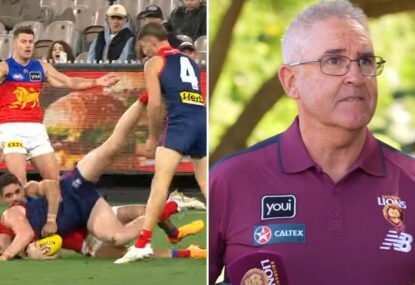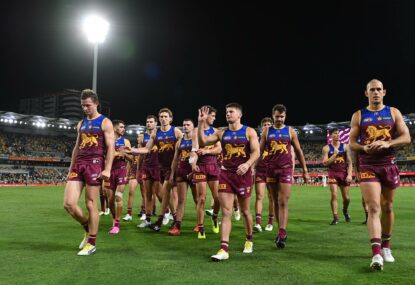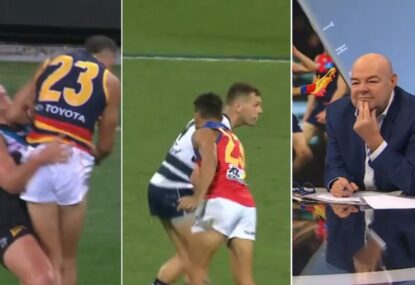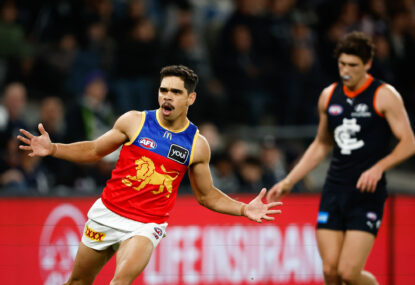After nearly a decade in the doldrums, the drums are continuing to beat louder at the Gabba as the Brisbane Lions close in on a long-awaited return to finals football.
A lot of water has passed under the bridge since 2009, which was the last time the Lions featured in September.
That year they finished sixth on the ladder and came from five goals down to beat Carlton in a home elimination final before bowing out to the Western Bulldogs the following week.
When reigning Coleman Medallist Brendan Fevola joined the club prior to the start of the 2010 season, many Lions fans grew excited at the prospect of him and Jonathan Brown teaming up to form a feared two-pronged forward line.
The Lions went on to win their first four matches to sit second on the ladder after as many rounds, behind only St Kilda on percentage, and many believed the improvement that had started under captain-come-coach Michael Voss would continue.
But that’s when it all started to fall apart – a 50-point loss to Melbourne would trigger a spectacular fall from grace that would ultimately see them crash to a 13th-place finish, winning only three more matches for the season, though one of them was against the eventual premiers Collingwood.
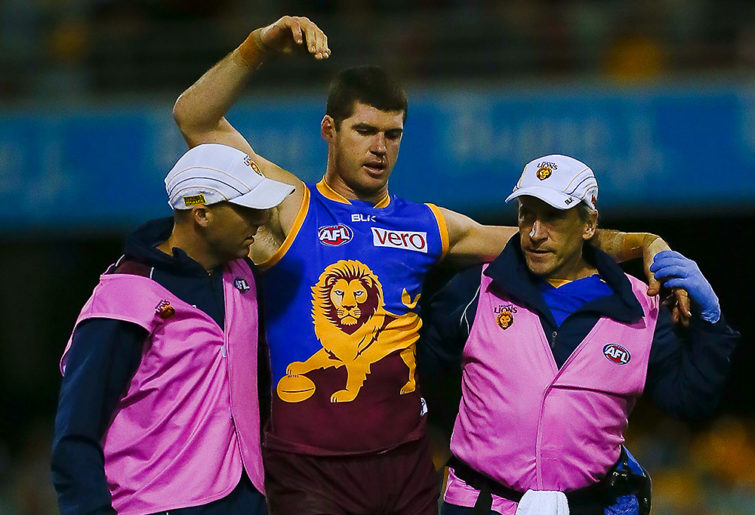
(Patrick Hamilton/AFL Media)
Having seen his time at Carlton come to an end following his disgraceful behaviour at the 2009 Brownlow Medal, further issues relating to alcohol and gambling saw Fevloa’s time at the Gabba also cut short, the Lions terminating his contract in February 2011.
That season saw the on-field regression continue as they finished third-last with just four wins for the season, only one of which was against a Victorian club when it defeated North Melbourne at the Gabba in Round 9.
While seasons 2012 and 2013 saw improvement, the call was made to sack Michael Voss as coach with three rounds remaining in the latter season, even though the Lions were still in a position where they could make the finals.
In both of those seasons the Lions won ten matches, including six out of a possible six against the expansion clubs, the Gold Coast Suns and GWS Giants, finishing 13th and 12th with percentages of 91.01 and 89.65 respectively.
Another of the club’s triple-premiership winning heroes was brought in as coach, with Justin Leppitsch taking over from Voss after serving as an assistant coach at Richmond for several years.
His time as coach at the club saw little progress, finishing no higher than 15th in his three seasons at the Gabba.
Despite having his contract extended in 2016, a multitude of embarrassing defeats saw the club lose patience. He was sacked the day after the Lions lost to St Kilda by nearly ten goals at Marvel Stadium in the final round of the season.
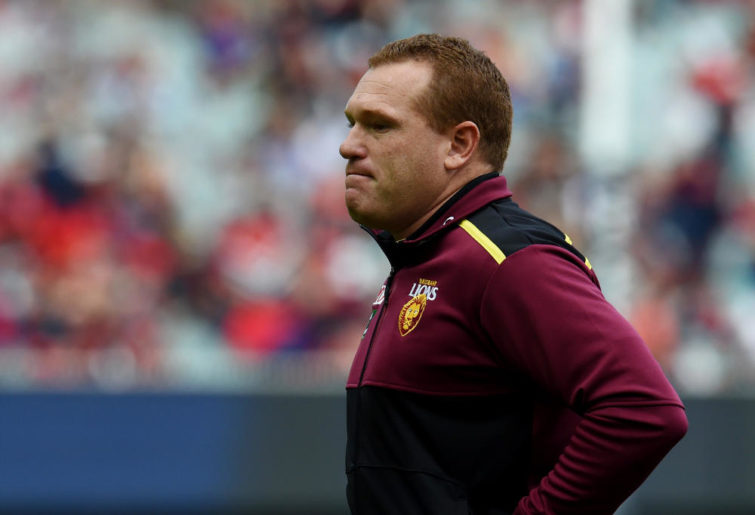
(AAP Image/Tracey Nearmy)
But it was during Leppitsch’s tenure as coach that the Lions recruited the players who have got them to where they are today – namely Darcy Gardiner, Daniel McStay, Lewis Taylor, Harris Andrews, Eric Hipwood, Ben Keays and Rhys Mathieson, among many others.
Hawthorn assistant Chris Fagan was then appointed the club’s next coach, landing his first senior role at 55 years of age. The draft that followed saw the likes of Hugh McCluggage, Jarrod Berry and Alex Witherden arrive at the club.
His first season as Lions coach was a tough one, delivering the wooden spoon, their first since 1998, with just five wins from 22 matches and a percentage of 74.3.
Finishing last, however, saw the club secure the No. 1 pick in the draft, which they would use on promising forward Cameron Rayner, who was given the No. 16 guernsey made famous by Jonathan Brown during the club’s golden days of the 2000s.
Experienced heads Luke Hodge, whom Fagan knew from his time at Hawthorn, and Charlie Cameron arrived at the club via trades, and the rebuild was on its way.
Season 2018 saw the club equal the five wins from the previous season, but progress was starting to be made as they finished 15th with a percentage of 89.1.
They were able to beat fourth-placed Hawthorn twice that season, but they also suffered defeats to lower-ranked sides St Kilda and Gold Coast, both part of an eight-match losing streak to start the year.
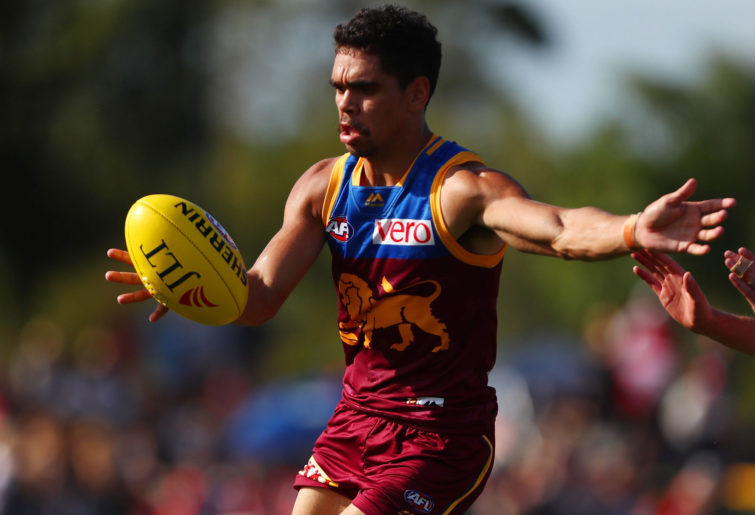
(Chris Hyde/Getty Images)
The subsequent off-season saw Lachie Neale, Lincoln McCarthy and Marcus Adams arrive from Fremantle, Geelong and Western Bulldogs respectively, and Brisbane’s list rebuild was just about complete.
Their smart decision-making in the past few drafts is finally starting to come to fruition this year, with the club almost certain to participate in September for the first time in a decade.
Last Saturday the Lions recorded their 12th win of the season by coming from behind to beat North Melbourne by 12 points in front of 23,833 boisterous fans at the Gabba.
They now sit second on the ladder, behind only Geelong, with five rounds remaining in the regular season. They’re in prime position to claim a double chance, with which comes at least one home finals match.
As their results have improved this season, so too have the home crowds, with only one match – against Port Adelaide in Round 3 – failing to attract more than 20,000 spectators.
The visit by Collingwood, who always attract large crowds for their interstate games, on Easter Thursday attracted a season-best home crowd of 34,017 – Brisbane’s best figure since Round 2, 2010.
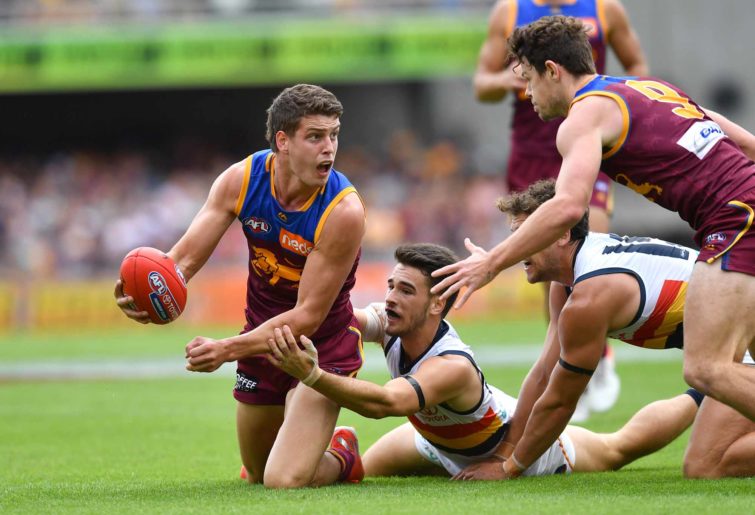
(AAP Image/Darren England)
But it was in that match, the Lions’ first Thursday or Friday night appearance at home since 2014, where they suffered their heaviest defeat of the season and only one at home so far, going down to the Pies by 62 points.
Apart from that, the season has also seen them smash several hoodoos – especially those against the West Coast Eagles, North Melbourne, Port Adelaide, Sydney, Adelaide, St Kilda and GWS, teams they hadn’t beaten for at least four years.
They also ended interstate hoodoos in Sydney and Adelaide, winning in those cities for the first time since 2009 and 2012 respectively.
This is the mark of a side that has matured in the past few years, a far cry from the depths of several years ago when they were largely uncompetitive under Justin Leppitsch, who has since returned to Richmond and played a coaching role in their 2017 premiership victory.
Though unlikely, if they were to win the premiership this year, they would beat their own record of going from wooden spooners to premiers in such a short space of time – Brisbane’s 2001 premiership, the first of a hat-trick of flags, came just three years after they finished last in 1998, a year in which their rugby league neighbours, the Brisbane Broncos, dominated the competition to win their fourth of six NRL premiership in seven years.
The wooden spoon-winning side that year featured the Scott twins, Brad and Chris, as well as Michael Voss, his brother Brett, Jason Akermanis, Alastair Lynch, Chris Johnson, Clark Keating, Craig McRae, Daniel Bradshaw, Darryl White, Justin Leppitsch, Luke Power, Marcus Ashcroft, Nigel Lappin, Shaun Hart, Simon Black and Tim Notting.
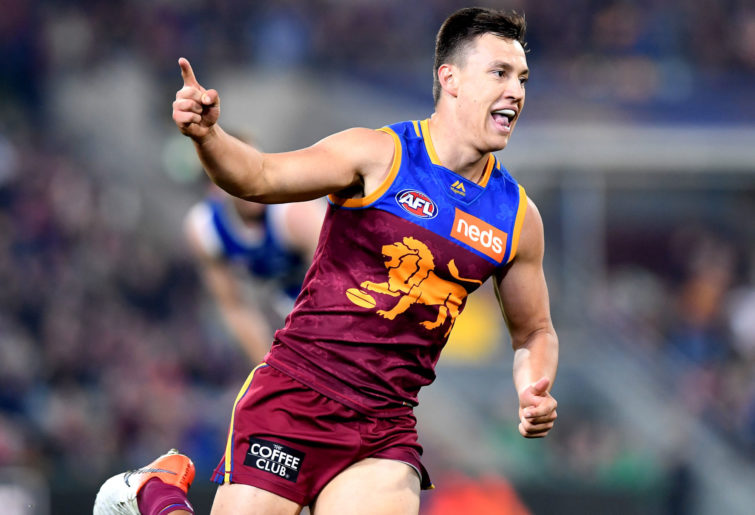
(Bradley Kanaris/AFL Photos via Getty Images)
All of them except for Brett Voss, who moved to St Kilda; Daniel Bradshaw, who missed the 2002 flag due to injury; and the Scott brothers, both of whom missed the 2003 flag due to injury, would go on to feature in each of the Lions’ three premierships between 2001 and 2003.
Akermanis and Black would win Brownlow Medals in 2001 and 2002 respectively, while Shaun Hart and Black would claim the Norm Smith Medal for being best on ground in the 2001 and 2003 grand finals respectively. Voss had already won a Brownlow, in 1996, sharing the honour with James Hird.
Brisbane’s success came in a golden period for sport overall in south-east Queensland, with the Brisbane Broncos winning three NRL premierships on either side of this period (1998, 2000 and 2006) and the Brisbane Bullets winning the NBL championship in 2007.
Similarly, the present-day Lions have the potential to achieve something similar if they can continue on their impressive run into September, when they, not the West Coast Eagles, Collingwood or Richmond, will be the team to watch.
But with the club having been out of finals for so long, it will remain to be seen how they handle the pressure cooker that is finals football, with most, if not all, of their players having never stepped onto this stage before.
Of the current Brisbane Lions squad, only Daniel Rich remains from the club’s most recent finals match, a 51-point loss to the Western Bulldogs in a semi-final at the MCG in 2009.
In fact not one player remains at the club today from the period in which Leigh Matthews was coach of the club between 1999 and 2008. History will also tell us that Ashley McGrath was the last player from any of their 2001-03 flags to retire from the game, bowing out in 2014.
However, there are those who have achieved significant success elsewhere, such as:
- Luke Hodge, who played in four premiership-winning sides with Hawthorn, captaining three of them and winning two Norm Smith Medals in 2008 and 2014;
- Allen Christensen, who played in Geelong’s 2011 premiership side coached by Chris Scott;
- Lachie Neale, who was part of the Fremantle side which lost to Hodge’s Hawthorn in the 2013 grand final; and
- Charlie Cameron, who was part of the Adelaide Crows side which lost to Richmond in the 2017 grand final.
When it comes to performing in September, some teams flourish and some crumble for varying reasons.
Most notably, in 2013, Richmond contested its first finals series for 12 years. After leading Carlton by five goals in the third quarter they capitulated to lose by 20 points in the elimination final.
They then lost subsequent elimination finals against Port Adelaide and North Melbourne in the following two years respectively but would go all the way in 2017 with convincing victories over the Geelong Cats, GWS Giants and Adelaide Crows in the big one.
The elimination final loss to the Kangaroos in 2015 came after their opponents unfurled a banner that made fun of the Tigers’ dismal finals record, reading: “Tigers don’t win finals, we do!”.
In 2016 the Giants contested their first finals series in just their fifth year in the competition and stunned many by defeating their much more experienced opponents, the Sydney Swans, in a qualifying final before falling to the Western Bulldogs in the preliminary final.
And last year Melbourne ended its 12-year finals drought after finishing fifth, going on to defeat the Geelong Cats and Hawthorn in consecutive sudden-death finals before bowing out to the West Coast Eagles at the penultimate stage.
Like the Lions, the Dees had endured several years at the bottom of the ladder, the turning point coming when Mark Neeld was sacked halfway through the 2013 season and Sydney Swans premiership coach Paul Roos was brought in to resuscitate the club.
It has been nine completed seasons since the Lions last played finals, so when the time comes, you can understand that the players will be excited, but also nervous at the same time.
This is why coach Chris Fagan will be banking on the experience of the likes of Luke Hodge, Allen Christensen, Lachie Neale and Charlie Cameron to get them as far into September as possible.
If the ladder remains as it is at the end of Round 23, they’ll face reigning premiers the West Coast Eagles in a home qualifying final at the Gabba.
It was back in Round 1 when the Lions showed just how far they had come from the dark days of the past decade, coming from 27 points down at quarter-time to thrash the more experienced Eagles by 44 points at home.
Past Lions sides would have thrown in the towel at the first change, and so this result gave them confidence that they could not only become competitive against the top sides but also beat them at their own game.
They have since built on that result to win 11 more games up to the end of Round 18. This is one win more than they enjoyed in the past two seasons combined, having won five times in each of 2017 and 2018.
If the Lions end up on the premiership dais on 28 September, then may the painful times the club endured this decade be replaced by far more enjoyable times at the upper part of the ladder.
And with the Brisbane Broncos unlikely to contest the NRL finals this year and the Queensland Maroons having lost State of Origin for a second straight year, the Brisbane Lions may as well become the new toast of town, as they did at the turn of this century.


































































































